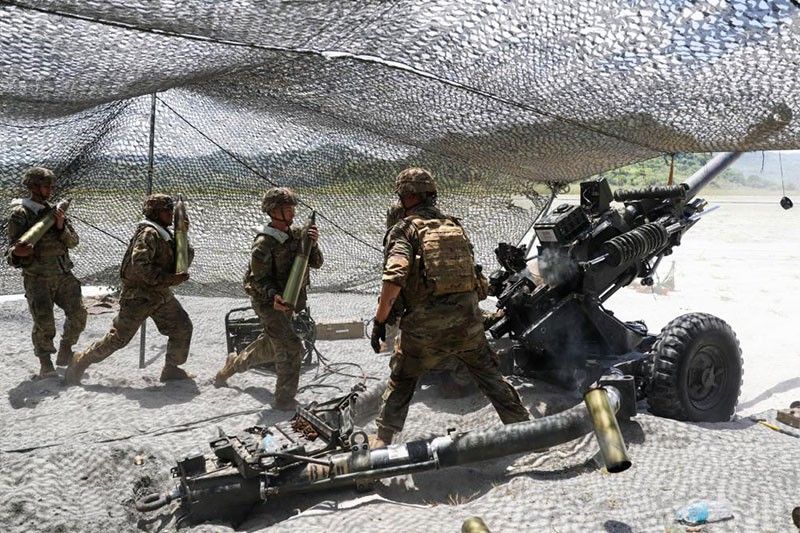Forging strategic collaboration for regional growth, maritime security

The geopolitical and geoeconomic landscapes of today are ripe with security challenges across various fronts. A domain where these challenges abound is the maritime space.
In the case of the Philippines, the West Philippine Sea holds immense importance. It is a pivotal concern demonstrating the country’s resolve to defend its national sovereignty, territorial integrity and economic rights. The area is important not only for the Philippines, but the Indo-Pacific as a whole.
For one, it is home to major submarine cable systems and landing stations that are vital to inter-island, regional and global connectivity. These interconnected cables serve as major conduits that enable data transmission across the globe, making it a global highway of digital networks.
Second, the West Philippine Sea is a primary maritime trade route. It serves as a passageway for vessels traversing the Pacific and Indian oceans, representing a significant portion of global trade.
As such, any disruption in this area, especially those brought on by aggressive actors, will surely have an impact on the movement of goods which include -- but are not limited to -- potential delays in delivery of products and rise in shipping costs.
Third, the WPS plays a central role in the national security and economic security of the Philippines as it is a composition of the country’s maritime waters. The area is also key to the security architecture of the region.
As such, the effects of any disruption in the West Philippine Sea have a definite impact not only for the Philippines alone, but the entire region.
In recent weeks, the Philippines has been monitoring the presence of Chinese vessels in its waters. More specifically, the Philippines has been keeping an eye for China’s monster ship near the Zambales coast. Just this week, it has been replaced by another Chinese vessel.
We cannot stress enough that China has no legal basis to conduct its activities within our territory. This type of behavior is a clear violation of international law, threatening to disrupt the security and stability of the region.
Recognizing the strategic importance of the maritime space and staying true to its identity as a maritime and archipelagic nation, the Philippines continues to build its external defense capabilities.
A Stratbase Institute-commissioned survey conducted by Pulse Asia Research Inc. revealed that 51% of Filipinos believe that the current administration must reinforce alliances and elevate partnerships by conducting joint patrols and military exercises with allies, friends, and partners.
Conducting cooperative activities with like-minded partners such as Japan and France will make a lasting impact on maritime security. Our partnerships with these countries have been continuously enhanced especially in the last year.
For Japan, being one of Filipinos’ most trusted development partners, its strategic partnership with the Philippines was fortified with the signing of the Reciprocal Access Agreement last December.
This month featured several engagements that further solidified this relationship. First of which is the trilateral phone call among Philippine President Marcos Jr., Japanese Prime Minister Shigeru Ishida, and former US President Joe Biden.
Another notable engagement is the visit of Japanese Foreign Minister Iwaya Takeshi in Manila. During his visit, the two countries exchanged views on what a multilayered cooperation will look like, which encompasses defense and security, trade and investment, and economic and social development, among others.
Another reliable partner of the Philippines is France. As a fellow maritime or “blue” nation, France has consistently shown its solidarity with the Philippines across various aspects.
The active participation of France in joint military exercises such as the Balikatan Exercise continues to forge stronger cooperation through strategic cooperation and sharing of best practices. France has also committed to provide patrol vessels to the Philippine Coast Guard.
Moreover, a Visiting Forces Agreement between the two maritime nations is underway. This is expected to facilitate improved interoperability through military exchanges and joint training between French and Filipino armed forces.
In all of these endeavors, it is critical for the international community to demonstrate a unified stance against those that attempt to unilaterally alter the rules-based order.
The Philippines, along with its like-minded partners such as Japan and France, among others, must make it unequivocally clear that any effort to undermine any state’s territorial integrity or circumvent the rule of law will not be tolerated.
The above-mentioned milestones, in Manila’s partnerships with Tokyo and Paris, paint a bright future for a comprehensive maritime cooperation. These serve as a prelude to greater cooperation in 2025.
The potential of cooperation, especially in the context of the West Philippine Sea, is endless. Although risks are present, it also provides a good opportunity to explore other collaborative strategies.
In the security front, areas of cooperation that may be explored include enhancing maritime domain awareness and building naval capacities among others.
Meanwhile, in the economic front, like-minded partners may also explore partnerships to develop the blue economy.
This may include enhancing the protection of global digital and shipping highways, modernizing of port and facilities, building resilient infrastructure, conserving biodiversity and marine environment, and strengthening scientific exchanges among others.
In today’s interconnected world, there is no doubt that a collective approach is one of the best ways forward – whether it is maritime cooperation in the defense or in the economic front. Partnerships grounded on mutual respect and shared democratic values are essential to a future-ready Philippines and for long-term regional growth, security and stability.
Katrina Guerrero is a program and research manager for defense and security at think tank Stratbase Institute.
- Latest



























